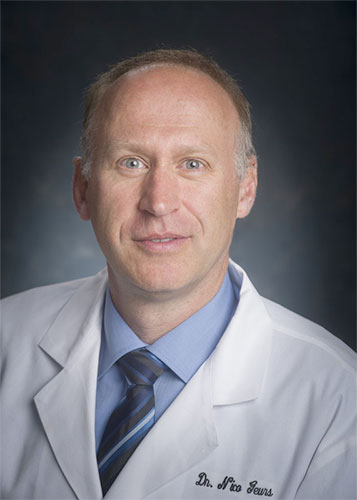 Nico Geurs, DDS, the Dr. Tommy Weatherford/Dr. Kent Palcanis Endowed Professor in the UAB School of Dentistry.An occasional battle with bad breath is unfortunately an experience many share, and researchers estimate that more than 80 million Americans suffer from chronic halitosis.
Nico Geurs, DDS, the Dr. Tommy Weatherford/Dr. Kent Palcanis Endowed Professor in the UAB School of Dentistry.An occasional battle with bad breath is unfortunately an experience many share, and researchers estimate that more than 80 million Americans suffer from chronic halitosis.
Nico Geurs, DDS, the Dr. Tommy Weatherford/Dr. Kent Palcanis Endowed Professor in the University of Alabama at Birmingham School of Dentistry, says bad breath can result from the development of a biofilm of bacteria that emits a bad odor.
“Bacteria can organize on the tongue, teeth and mucosal surfaces,” Geurs said. “An additional source can come from the throat, esophagus and stomach, and expired air from the lungs.”
Poor oral hygiene allows food particles to collect on the surface of the tongue, between the teeth or along the gum tissue that surrounds the teeth. Naturally occurring bacteria in the mouth then break down those food particles, releasing chemicals that have a strong odor.
“Brushing twice a day can prevent biofilm formation,” Geurs said. “If this is the source of bad breath and no gum disease is present, twice-a-day brushing can make a difference. Brushing your tongue and flossing are important also.”
Geurs recommends scheduling regular dental visits to maintain a healthy mouth, adding that cavities, gum disease pockets and coated tongues can harbor bacteria that release sulfur compounds that can smell like rotten eggs, smelly feet or fecal matter.
Infections in the mouth, like tooth decay, gum disease or mouth sores related to other conditions, also might contribute to bad breath. Surgical wounds from extracted teeth also can be a source of halitosis.
Diet changes can also combat bad breath, Geurs says. Once food is digested, chemicals that cause odor can be absorbed into the bloodstream, then the lungs from which they are exhaled. Expectedly, garlic and onions can worsen breath, but the American Dental Association has presented research that shows diets high in protein and sugar have been associated with bad breath.
Morning breath is a common form of bad breath, and according to the ADA, people with dry mouth are at an increased risk.
“During the night while you sleep, the salivary flow decreases and changes the bacteria in your mouth,” he said.
This results in dry mouth because people do not swallow or drink during the night. To avoid dry mouth and the resulting morning breath, the ADA recommends chewing sugar-free gum and brushing teeth gently at least twice a day with fluoridated toothpaste. This may help relief from, or prevent, adverse aftereffects of dry mouth.
Dentists can help identify the cause of bad breath. The diagnosis could be simple based on patient history and complaint, and dentists can even use a device that measures volatile components in the breath. If the bad breath is due to an oral condition, dentists can develop a treatment plan to help eliminate it.